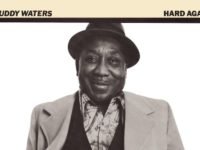McKinley Morganfield, aka Muddy Waters, paved the way for many a blues / rock / jazz fusion artist. He also sowed the seeds of a good number of blues influences genres and bands. As such he needs no introduction to those who cut their teeth on blues music. But for those who did not, Muddy Waters 100 is a great way to meet the man and know his legacy.
The album, constructed as a centennial tribute to Waters and due on July 24, 2015 via Raisin’ Music Records, is a contemporary tribute to the genius of the man by some of the most eminent blues musicians of our age including John Primer, Johnny Winter, James Cotton and Gary Clark Jr. Muddy Waters 100, produced by double Grammy-winning producer Larry Skoller, comes in a collectible CD-sized hard-cover book with 48 pages illustrated with atmospheric black-and-white photographs and an original essay by Robert Gordon, himself a Grammy-winning author of the definitive Muddy Waters biography Can’t Be Satisfied: The Life and Times of Muddy Waters.
Muddy Waters 100 features 15 newly recorded tracks, many of them with music from Muddy Waters band alumni, as well as many of today’s foremost blues players. James Cotton, a long-time Muddy Waters sideman, recreates many of the harmonica sounds he originally recorded with Muddy. Johnny Winter, who worked with Waters late in the older bluesman’s life, actually recorded on this album just a few weeks before his own death. Derek Trucks, Bob Margolin, Billy Branch and Shemekia Copeland also feature strongly, as do members of the Living History Band: Kenny “Beedy Eyes” Smith, Johnny Iguana, Felton Crews and Billy Flynnr. Muddy Waters 100 features a track breakdown, giving details of the original recordings, musicians playing and a brief history of each number.
“Got My Mojo Workin,'” originally recorded by Muddy Waters in 1956, opens the set. His version made Rolling Stone magazine’s list of the 500 Greatest Songs of All Time and was inducted into the Grammy Hall of Fame in 2000. This new take finds Shemekia Copeland leading a re-working of the classic with steady underpinning from all musicians. “Still A Fool,” featuring Derek Trucks on slide guitar, is a deep, rich rendition of the 1951 number and is followed by “I Be’s Troubled” featuring Bob Margolin on slide guitar. “I’m Ready,” a great track, gives Winter a final chance to share his passion on slide. It was recorded previously in 1978 and is an example of Muddy’s use of electronic effects in his music.
The brilliant “Mannish Boy” starts with deep, growly vocals, segueing into bass, rhythm and deliciously roguish vocals. “Rosalie” is given a really good, moving rendition, while “Why Don’t You Live So God Can Use You” has a strong gospel feel, accentuated by the harmonic choral vocal from the band. “Good News” is lively and energetic, with glorious harmonica backing the vocals and a beautiful harmonica solo at the mid point. “Trouble No More” is an electrically charged version of the original number, and features a delicate yet strongly rhythmic element provided by drums and guitars. “She Moves Me” takes it all down a level with slow, driving blues, moved on and forward constantly, rolling, rippling and sweeping. “Can’t Get No Grinding” takes the tempo back up and lifts the heart; it’s swiftly followed by “Forty days and Forty Nights,” “Last Time I Fool With You,” “I Feel So Good.” The glorious “I Feel Like Going Home” completes Muddy Waters 100.
What this album does is present original Muddy Waters’ songs with a modern take, making blues music relevant and accessible to new listeners as well as offering an updated take on some of the numbers for those well already familiar with it. It is a fitting tribute, because Muddy Waters was a blues player who also pushed boundaries, broke any rules he could and saw blues music as neither definitive nor with any set boundaries.
Each number is a little snippet of a story, as a new generation traces Muddy Waters’ tales of sex, seduction, wrong doings and rejection — even while celebrating good things, too. What Muddy Waters 100 also shows is that many of the versions, here recorded using modern technology, differ in essence little from the originals because Muddy Waters already recorded music using effects which were at the forefront of what could be achieved at the time, including electric effects, overdubbing and creating a link between rock, blues, folk and country sounds. Yet, there was always something distinctive about the Muddy Waters sound, which is strongly blues grounded, yes, but limited, absolutely never.
The spirit of Muddy is definitely in this music but it makes no effort to “be” Muddy. That could only happen once. Still, this collective production by musicians who are helping to redefine the blues genre takes his music and gives it to a whole new generation.
- Milena Casado – ‘Reflection of Another Self’ (2025) - May 4, 2025
- Luis Ianes and Noel Akchote – ‘Seuil’ (2025) - April 12, 2025
- David Dower Trio – ‘Sonder’ (2025) - March 23, 2025



